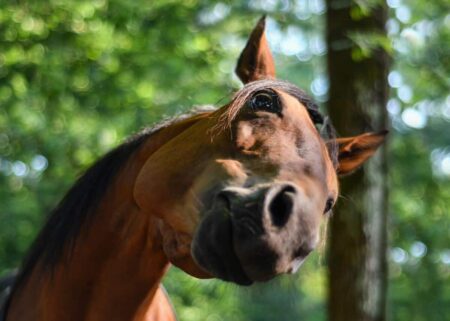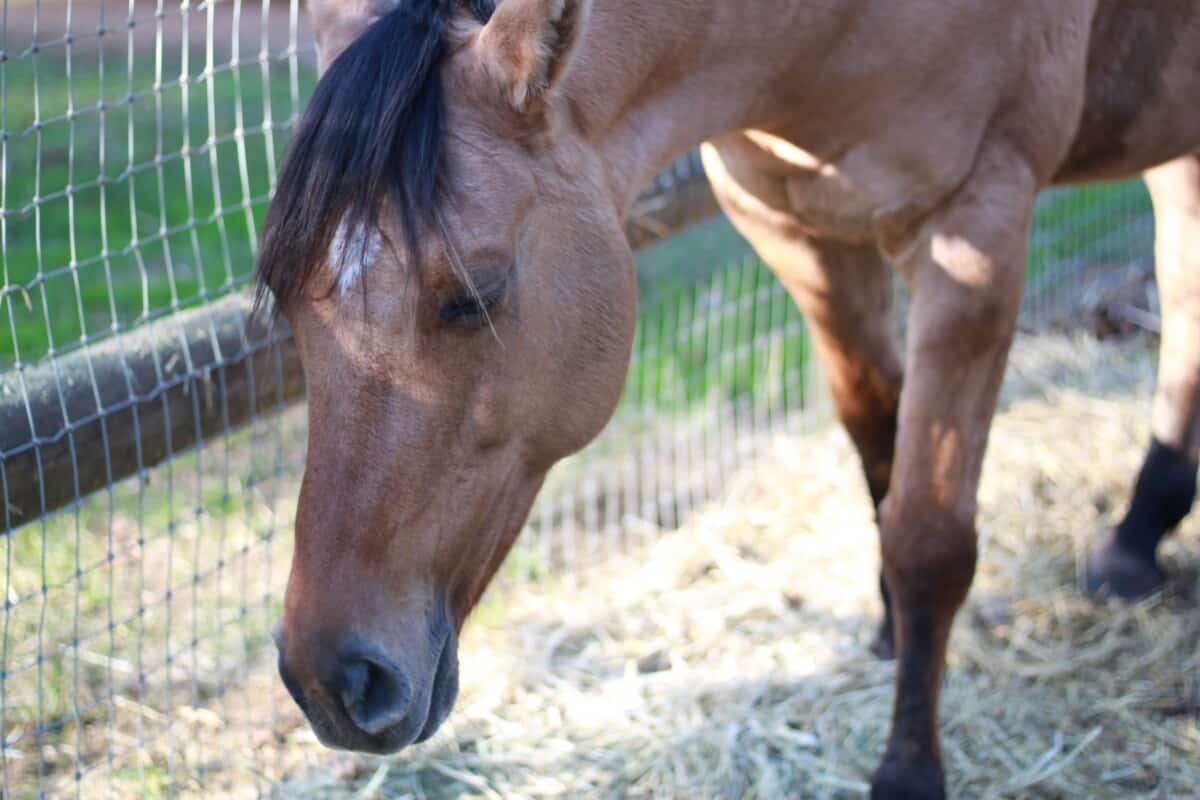
We’ve all been there. You’ve tacked up, tied up, picked out hooves and you’re already daydreaming about galloping your horse across the open countryside. Then you remember your hat is in the tack room. You look over at your four-legged best friend, wondering if he’ll be ok just for a few moments while you dash and get it. But should you be leaving him unattended?
The reality is that we all have to leave our horses unattended sometimes. As much as we might like to, we can’t be with them 24 hours a day, 7 days a week. Countless factors relate to the decisions you’ll make about when to leave them unattended and when not to, but 5 key areas to consider are:
- How long will you be gone?
- Your horse’s living arrangements
- New or unusual situations
- Your horse’s needs and temperament
- General safety assessment
How Long Will You Be Gone?
How long can you leave a horse unattended? Well, everything is relative. Like us, their basic needs are food, water, and shelter. So, if your horse is out in the field grazing then you might leave him there unattended for a few hours or overnight, provided those basic needs are met. On the other hand, if there is something unusual happening then his needs may become more complex. For example, if he has just unloaded off the trailer into unfamiliar surroundings and is distressed, then you won’t want to leave him alone even for a moment. It’s all about judging what could happen in the time that you’re not there and trying to minimize any risk – to your horse and to the people and animals he shares his space with.
What are Your Horse’s Living Arrangements Like?
What sort of environment you keep your horse in will determine how you manage your time with him; what routine you have, whether you leave him unattended and how long for.
Yard or Stable

If your horse is stabled in a busy yard, then he is unlikely to be left completely unattended for long, as people are coming and going all the time. Often, yards like this have effective cooperative systems between owners to ensure each horse’s needs are attended to without everyone having to be there, all of the time. You might like to suggest this if it’s not in place already.
However, if your horse is on a smaller yard, lives alone, or is stabled in a remote location then you will need to be there yourself a lot more. If this is difficult then try reaching out to neighboring equestrians – most people are keen to pool resources and get more quality time with their horses rather than having to make frequent, shorter, more perfunctory visits.
Horses who are stabled will usually need care at least two to three times a day, most likely in the morning and evening, and a couple of times throughout the day.
In between mucking them out, checking them over, feeding, watering, rugging, exercising, grooming, socializing and bonding with them (phew – that almost makes horse care and maintenance sound are tiring as it is!), it wouldn’t be unusual for them to be left to their own devices for a few hours at a time.
Living Outdoors
It’s a bit of a misconception that horses who live outdoors need less care or can be left unattended for longer than those that are stabled. Granted, a field doesn’t need to be mucked out as frequently as a stable, but it’s also a much larger area so walking around it when you do need to can take much longer!
Fields also need to be checked regularly for foreign bodies and poisonous plants, shelters and fences checked for good repair, and your horse checked for lumps, bumps, or changes. It can make things a bit easier, in the long run, to break these jobs down and do them bit by bit. Visiting frequently to do a little bit at a time has the added benefit that your horse isn’t left unattended for long at any point. We all know that injuries from kicks and bites among the herd, mishaps with rugs, or even weather damage can happen in a heartbeat.
Whatever your horse’s living arrangements, you will soon find a rhythm to suit you both. It is good to mix your routine up a little from time to time though. Not only can this prevent bad habits from your horse (eg. kicking the stable door or barging the gate when it’s ‘time’ to be fed) but also can act as a deterrent for thieves. Often horse thieves will watch the owner’s routine for some time before striking. An unreliable schedule, varying the length of time you leave your horse unattended for, and not being absent for significant periods, will give a thief a limited window of opportunity and they’ll hopefully decide it’s not worth the risk.
New or Unusual Situations
So, you’ve found your rhythm. You’re making regular checks, getting a good mix of quality time with your horse, and bonding as well as attending to all his needs. But what if anything changes?
Changes to Living Arrangements
From time to time, you might need to move your horse to a different yard or field or integrate a new horse into the herd. At times like these, it’s going to be beneficial to shorten the periods you leave him unattended for. Not only can you monitor his reaction to the change, but you will be there, ready to step in if anything untoward happens. You’ll also be a comfort to him as someone he knows and trusts in otherwise unfamiliar surroundings.
Competitions
The alien environment of competition can leave a horse feeling unsettled and more likely to behave out of character. Even a seasoned competitor can spook unexpectedly or be affected by other horses behaving unusually around them. Many owners choose to have a groom to stay with their horse throughout, but if you do need to leave them unattended for a short period, be sure to check they won’t cause any damage to themselves or others while you are gone. You can close them inside the trailer and leave them with a hay net, for example – which may feel a bit more familiar to them, like their stable at home.
Events and Celebrations
Most people love celebrating for events such as 4th July or New Year’s Eve, but for animals, the flashing lights and loud bangs of fireworks can be very distressing. Lots of owners will bring outdoor horses indoors for the duration, but even if you have this option you will probably also want to ensure your horse isn’t left unattended during this time. Sure, you are there to make sure they don’t bolt their stable or jump their fence, but also spending time with your horse and reassuring them when they are scared will deepen the bond between you. This is great in itself and he’s also more likely to trust you when you ask him to do things he is not sure of in the future.
Your Horse’s Needs and Temperament
You know your horse better than anyone; there are things only you know that will help you decide whether to leave him unattended and how long for.
Is your horse young or particularly nervous? If so, it’s important to support him when he’s faced with new or scary sights, sounds, and experiences. You still can’t be with him all of the time, but you will no doubt choose your absences carefully, only leaving him unattended when he’s in familiar surroundings or with an older, more confident member of the herd.
Does your horse have any special physical needs? If so, then your time with him will be shaped by those needs. You might need someone to be there to monitor him closely, administer medication, dress a wound, bathe a tendon, for example. In these cases, you might only leave him unattended for very short periods, or not at all.
Does your horse get bored easily? Some ‘bored’ horses are prone to developing vices such as windsucking, weaving, or cribbing. Providing ways to pass the time when he is alone, such as toys, salt licks or slow feeder hay nets can help and we love Jolly Balls (you can order them from Chewy here) because the horse can both kick it around as well as lift and throw it using his mouth when she’s outside. In the stall, something like this hanging from the ceiling is usually a better way to go for entertainment. Our horse, however, is very happy with the Himalayan Rock Salt Block so if your feel your horse needs some added stimulation, just try out a few different things to see what amuses him.
But of course, nothing beats exercise, stimulation, and regular changes of environment. Minimizing the time that your horse is left unattended will help you to provide all of this for him.
General Safety Assessment
Anyone who spends time around horses soon learns to be super vigilant when it comes to safety. Usually, because we’ve had an accident or two to teach us we can’t be complacent! You can never be too careful though, so doing a mini risk assessment each time you think of leaving your horse unattended is a really good habit to get into.
From tack, rugs, shoes, boots, buckets, troughs to people, events, trailers … all the ‘things’ we introduce into our horses’ lives can pose a hazard. It’s up to us to ensure everything is in good working order, fitted well, or stored safely so that no harm will come while we are not there.
With all of these considerations made, it’s clear that there are times when it’s fine to leave horses unattended, provided sensible steps are taken before you do. It’s usually just a case of balancing safety and comfort for them with a suitable schedule for you.
But remember fun and bonding in that schedule as well as meeting their basic needs. Not only will your horse benefit – spending quality time with him is good for your headspace too!
You Might Also Like..
This article is accurate and true to the best of the author’s knowledge. It is not meant to substitute diagnosis, prognosis, treatment, or any type of medical advice for humans or horses. Animals exhibiting signs and symptoms of distress should be seen by a veterinarian immediately.


